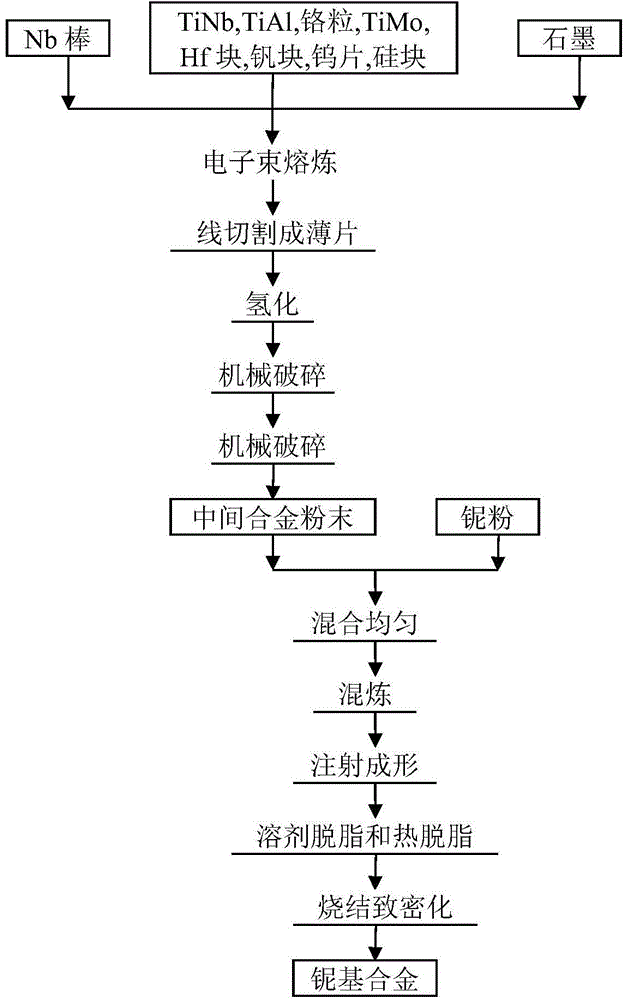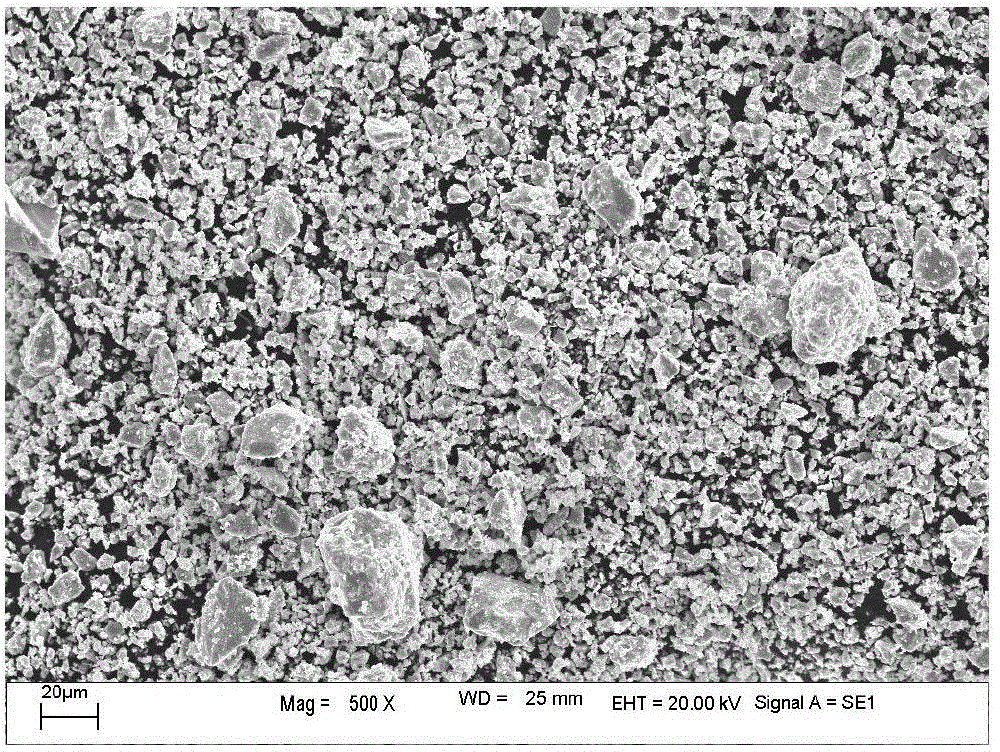Low-cost method for preparing niobium-base alloy
A niobium-based alloy, low-cost technology, applied in the field of low-cost preparation of niobium-based alloys, can solve the problems of restricting the application of powder metallurgy niobium-based alloys, low yield of fine particle size powder, difficulty in popularization and application, etc., to achieve large lattice distortion , Low preparation cost, cost reduction effect
- Summary
- Abstract
- Description
- Claims
- Application Information
AI Technical Summary
Problems solved by technology
Method used
Image
Examples
Embodiment 1
[0018] Example 1: Preparation of Nb-15%Ti-3%Al-4.5%Cr-5%V-0.5%Mo-3%W-2.5Hf-0.04%C alloy
[0019] The composition of the master alloy is designed according to the composition of the target niobium-based alloy. The composition of the master alloy is: 21.4%Ti, 4.3%Al, 6.4%Cr, 7.1%V, 0.7%Mo, 4.3%W, 3.6%Hf, 0.057%C and Balance niobium. Weigh TiNb alloy, TiAl alloy, chromium block, vanadium block, TiMo alloy, tungsten sheet, Hf grain, graphite powder and Nb rod according to the master alloy composition. Various raw materials are smelted in an electron beam melting furnace to obtain master alloy ingots. The niobium-based alloy ingot was cut into 1mm-thick slices by wire cutting, and then hydrogenated in high-purity hydrogen at a hydrogenation temperature of 550°C for 4 hours at a cooling rate of 0.5°C / min. During the hydrogenation process, a small amount of highly reducing magnesium particles are placed in the furnace to absorb impurity oxygen in the atmosphere. The hydrogenated a...
Embodiment 2
[0020] Example 2: Preparation of Nb-16%Ti-4%Al-4.5%Cr-4%V-0.5%Mo-3%W-2.8Hf-0.05%C alloy
[0021] The composition of the master alloy is designed according to the composition of the target niobium-based alloy. The composition of the master alloy is: 21.3%Ti, 5.3%Al, 6%Cr, 5.3%V, 0.7%Mo, 4%W, 3.7%Hf, 0.067%C and Balance niobium. Weigh TiNb alloy, TiAl alloy, chromium block, vanadium block, TiMo alloy, tungsten sheet, Hf grain, graphite powder and Nb rod according to the master alloy composition. Various raw materials are smelted in an electron beam melting furnace to obtain master alloy ingots. The niobium-based alloy ingot was cut into 2mm-thick slices by wire cutting, and then hydrogenated in high-purity hydrogen at a hydrogenation temperature of 750°C for 2 hours at a cooling rate of 1°C / min. During the hydrogenation process, a small amount of highly reducing calcium particles are placed in the furnace to absorb impurity oxygen in the atmosphere. The hydrogenated alloy fla...
Embodiment 3
[0022] Example 3: Preparation of Nb-14%Ti-3.5%Mo-3.5%V-2%Si-0.75%Hf-0.03%C Alloy
[0023] The composition of the master alloy is designed according to the composition of the target niobium-based alloy. The composition of the master alloy is: 18.7% Ti, 4.7% Mo, 4.7% V, 2.7% Si, 1% Hf, 0.04% C and the balance niobium. Weigh the TiNb alloy, TiMo alloy, vanadium block, silicon particle, graphite powder and Nb rod according to the composition of the master alloy. Various raw materials are smelted in an electron beam melting furnace to obtain master alloy ingots. The niobium-based alloy ingot is cut into 2mm-thick slices by wire cutting, and then hydrogenated in high-purity hydrogen at a hydrogenation temperature of 800°C for 1 hour at a cooling rate of 0.5-3°C / min. During the hydrogenation process, a small amount of highly reducing lithium sheets are placed in the furnace to absorb impurity oxygen in the atmosphere. The hydrogenated alloy flakes are mechanically crushed to obtain...
PUM
 Login to View More
Login to View More Abstract
Description
Claims
Application Information
 Login to View More
Login to View More - R&D
- Intellectual Property
- Life Sciences
- Materials
- Tech Scout
- Unparalleled Data Quality
- Higher Quality Content
- 60% Fewer Hallucinations
Browse by: Latest US Patents, China's latest patents, Technical Efficacy Thesaurus, Application Domain, Technology Topic, Popular Technical Reports.
© 2025 PatSnap. All rights reserved.Legal|Privacy policy|Modern Slavery Act Transparency Statement|Sitemap|About US| Contact US: help@patsnap.com


